Distinguished Critique: The Spirit (Book One) Review
Darwyn Cooke's take on The Spirit trades in the depth of some other narratives for an entertaining reimagining of an early comic hero
—by Nathan on May 14, 2024—
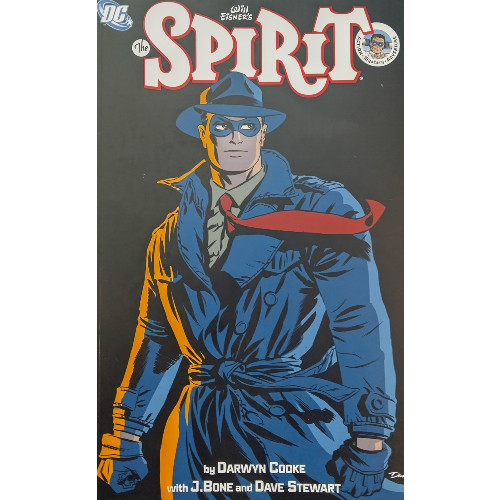
I struggle reading older comics. It's a combination of the (oftentimes) incredibly verbose, frighteningly dramatic prose combined with art which, while meritorious for crafting the iconic appearances of many classic characters and defining their earliest stories, pales in comparison to the technical prowess to modern day illustrators (which, as a note, is a purely subjective perspective and not a universal one either…I'd take John Romita over Rob Liefeld any day of the week). I draw the line at the 60s, and though I'll flip through early adventures of Spider-Man or the Fantastic Four, I prefer not to skip further backwards. I know the treasure trove of material this will deny me, and maybe that philosophy will change with time, but for now I'm okay denying myself the earliest depictions of characters such as Batman, Superman, Captain America, and the Spirit.
All that to say, I don't know much about Will Eisner's classic creation. I saw the movie directed by Frank Miller a handful of years ago, and other than enjoying a few decent scenes with Samuel L. Jackson, wrote off the experience as rather dismal. I know the Spirit's impact on the "comic book superhero" genre and can see the way in which he inspired the creation of characters such as the Question and Rorschach (though, notably, Rorschach was an analogue of the Question, so I suppose that's a moot point). But I know very little of his history, his stories, or his supporting cast.
That didn't dissuade me, however, from picking up a volume of Spirit comics when I noticed they were written and illustrated by Darwyn Cooke. As I discussed in my relatively recent Batman: Ego and Other Tails review, I've enjoyed what work of Cooke's I've read, whether it's been the late creator's DC: The New Frontier or his and Tim Sale's collaboration on Superman Confidential. I thought What the heck? This could be fun and added the volume to my collection.
I enjoy, as I’ve discussed elsewhere, following topical threads through this blog. "Micro series" spawn from those threads, whether it's a look at Image Comics' earliest publications or the history of the Spider-Man/Green Goblin feud. This volume of The Spirit has kicked off an interest in wondering what other modern depictions of famous pulp heroes I could uncover. DC's handled a surprising number of updates on classic characters, and I hope this review will jump start a small rabbit trail through some of those stories. Consider this as running parallel to the post-Crisis path I've been carving, a look at a different batch of DC publications.
The Spirit (Book One)
Writers: Darwyn Cooke, Jeph Loeb
Pencilers: Darwyn Cooke,
Inkers: J. Bone
Colorists: Dave Stewart
Letterers: Jared K Fletcher, Comicraft
Issues: Spirit #1-6, Batman/The Spirit special
Publication Dates: January-July 2007
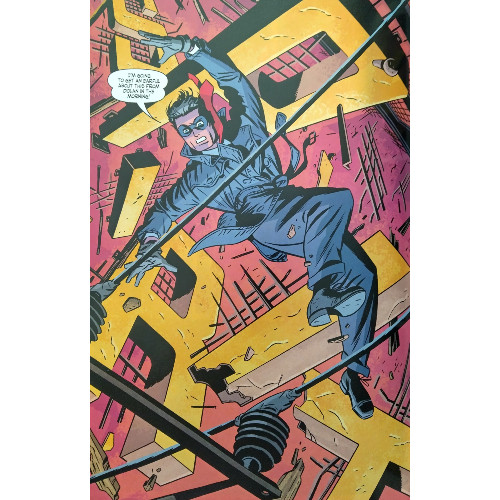
It's impossible for me to say, having never read Eisner's original narratives, whether knowing some additional background on the Spirit would have led me to enjoying these issues more than I already did. The key word there is "already." Cooke creates a delightful collection of narratives, presented in an anthology format yet woven together through repeating characters and references. His art style, verging on cartoon-ish, feels heavily inspired by his career in animation and, much like with New Frontier and Ego, provide a more whimsical palette over a somewhat darker take on the classic character.
What's most striking about the Spirit is how normal the man is and how Cooke presents him as just this dude in a blue coat, hat, and domino mask. He doesn't rely on the same gadgets and gizmos that Batman wields (those "wonderful toys," as Jack Nicholson put it); he doesn't have a Batmobile, relying instead on a teenage "hack" driver to ferry him from place to place; even his HQ is less a fully-fledged Batcave and more of a hole beneath gravestones. I don't know if Eisner wove in these elements to remark on the Spirit's humanity, intentionally grounding the character while creating this wraith-like aura around a man presumed dead. But Cooke uses those grounded elements to his advantage, keeping the Spirit's "just a man" persona front-and-center. He's no legend or superhuman. He can get roughed up in an alley, ambushed, taken prisoner, caught unawares by a villain's vulture sidekick.
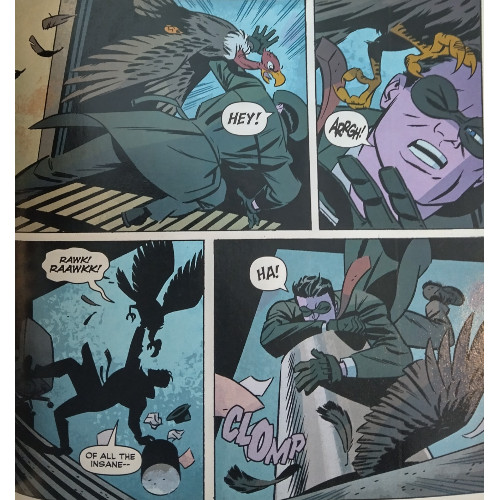
That rougher, back alley vibe allows Cooke to maintain a consistent tone that feels similar to what might be found in dime store detective novels (a tone, I assume, which was similar to the original Eisner stories). Cooke doesn't go all-out noir, the Spirit never walks into an office to find a widow or divorcee waiting for him with a case, but these stories maintain the flavor of another time while being placed in a surprisingly modern setting. I assume Eisner's Spirit never had to deal with a food processing company using his likeness to sell a line of canned beans to children. The aura Cooke provides makes me wonder what his take on a character like Daredevil would have been, a narrative style which wouldn't perfectly replicate the noir elements established by Frank Miller but wouldn't shrink away from the shadows as Cooke saw fit.
The modern setting allows for updates on characters who, from what I've read, were more difficult to swallow in Eisner's original narratives. Ebony White is presented as a young African American boy driving a taxi who becomes a quasi-sidekick to the Spirit, a far cry from the character's original portrayal, viewed by many as racist. A female FBI agent is offered a decent amount of FBI agency, even when she's physically connected to the Spirit, becoming the real hero in one issue by taking a final stand against an enigmatic adversary. There are touches here and there which still feel a tad discomforting–some may find Cooke's portrayal of an Islamic character a bit pigeon-holed–but I say that more for concerned readers than myself.
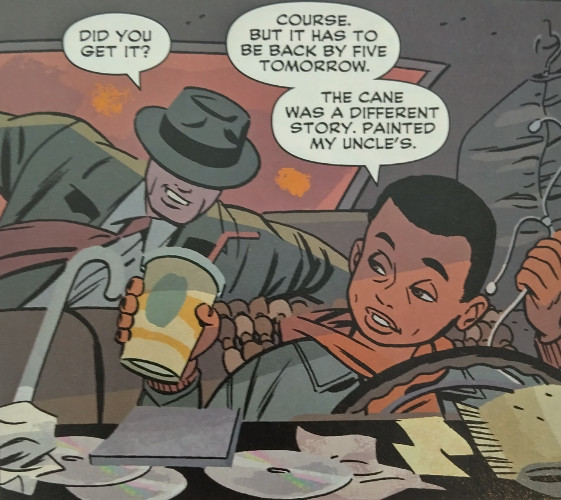
Each narrative is written to largely stand on its own, somewhat strung together by details which point to at least one overarching subplot. The momentum rarely lasts more than an individual issue–in other words, you're not reading the next issue to determine where the story goes but to watch where Cooke will place the blue-suited adventurer next and how he'll use his cunning to get him out of tight spots. The aforementioned subplot does provide some deeper interest and offers new insight into the Spirit's classic origin, but it isn't explored in much depth here. I know a second volume of Cooke's run exists, and if I ever choose to pick up, I'd be excited to see if that particular arc develops further.
Denny Colt, the man behind the mask, can be a tough character to become attached to. After seemingly dying on a case, Colt is placed in a mausoleum, from which he extricates himself after waking. Deciding to remain "dead," Colt assumes his apparitional alter ego, choosing to reveal his true identity to a select few. I don't know how Eisner balanced the idea of Colt being alive but remaining legally dead, and I was hoping Cooke would weave in some of that drama. He doesn't, allowing the Spirit a single movie night with a girlfriend before heading out to fight crime. Unlike Cooke's Ego, which created substantial, metaphorical conflict between Bruce and Batman, there's no interesting conundrum here between Colt and his other identity. There's no sense that Colt lives a regular life on top of his crimefighting; he wears the mask so often, the identity of "Denny Colt" becomes little more than a facade on which Cooke paints an updated origin story.
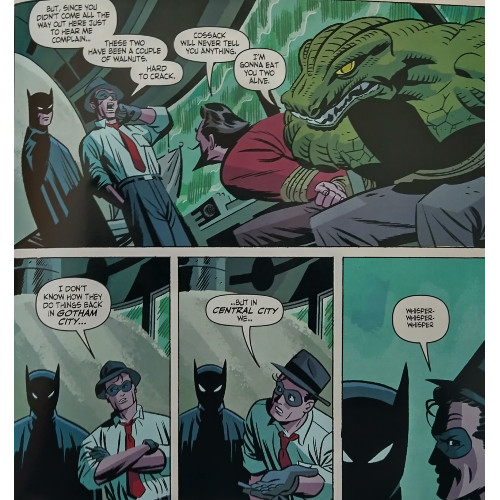
The highlight of the volume teams Cooke with Batman: The Long Halloween scribe Jeph Loeb for a very fun Batman/Spirit partnership. Featuring an assemblage of both heroes' rogue galleries, the special is a treasure trove of Easter eggs and references–Commissioner Gordon swaps notes with Commissioner Dolan, the officer the Spirit reports to, commenting on their daughters and their partnerships with enigmatic masked men; each hero bumps into the other character's femme fatale before ever interacting themselves; the Spirit's less finessed tactics are compared to Batman's penchant for plotting. You don't necessarily walk away with a detailed list of comparisons and contrasts between the characters–Loeb never, for example, offers any incredible insight into how the characters overlap or differentiate–but it's a very fun issue. Just seeing characters like the Joker and the Spirit's arch-nemesis the Octopus on the same page is a treat, even if it feels more for the sake of fan service than depth of narrative.
Darwyn Cooke provides an engaging version of the Spirit which keeps what it should–the tone, the humanity at the center of its title character–while updating what it must–the setting, the supporting cast members. Each chapter tells a complete story while hinting at broader plots, never feeling inundated with unnecessary detail. Yes, sometimes, the plot takes away from the characterization–I do wish we learned more about Denny Colt as a character–but Cooke's Spirit feels comfortable in the space provided. Knowing some of the character's history would, admittedly, allow me a better connection to his world, allies, and adversaries, but if you're going to enter the Spirit mythos blind, this feels like the perfect foundation to lay.